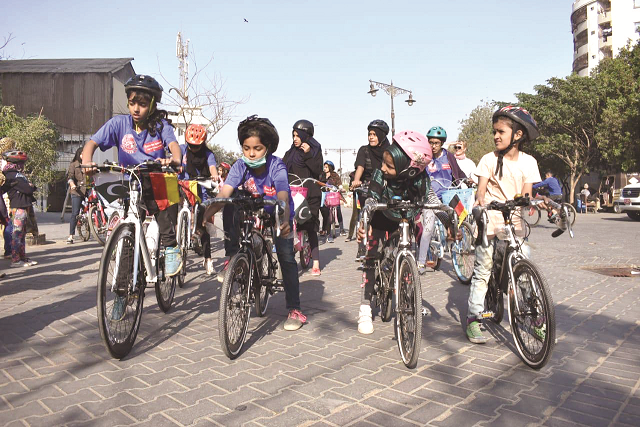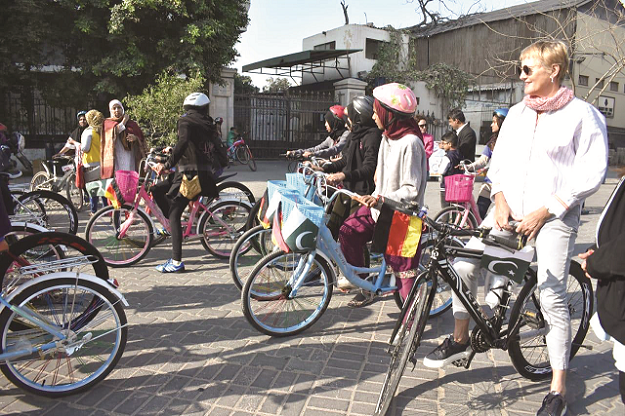
Birgit Khilmann, the Deputy Head of Mission at the German Consulate, formally handed over the cycles and spent time with the cyclists in Lyari. They cycled together near the Custom House, Eduljee Dinshaw Road. "I am really happy that Lyari's girls are freely riding cycles without any fear," said Khilmann, adding that the German Consulate often encourages such healthy activities.
Lyari Girls Café marches to celebrate Universal Children’s Day
 PHOTO: PRESS RELEASE
PHOTO: PRESS RELEASESpeaking to the media, Dawood said that the female cyclists have not only encouraged other girls and women to cycle freely on the streets but have also managed to motivate boys to use cycles as a mode of transportation. She pointed out, however, that the city's streets were not always conducive to the activity.
"There is no space for cyclists. Town planners must consider spaces for cyclists in their future planning. The number of cyclists is increasing with each passing day," she said. She expressed the hope that cyclists would soon replace motorcyclists.
Parents of the cyclists and others from Lyari were present on the occasion.
Uphill journey
The streets of Lyari are populated by men. You see them smoking, gossiping or playing games, either on the footpath or in small gaming arcades. The women can be spotted making their way through the narrow streets to Lyari Girls Café where they study and receive vocational training.
The peculiarly-named institute is set up on the fourth floor of a residential building and has a big rooftop, which is adorned with beautiful handicrafts and embroidered sheets. The place is also furnished with comfortable couches and has board games like carrom and ludo.The cafe doubles as a vocational training centre and a communal space for women and children of Lyari. While the managerial and support staff comprises entirely of women and many of its initiatives are geared towards women empowerment, the café offers education and activities for the boys of Lyari as well.
Lyari's 'Theatre of Dreams'
However, when the girls decided to take up cycling they faced severe backlash which included threats and harassment.
"The girls wanted to partake in activities, [for some] their families permitted as well, but society was restrictive," Rimsha Raheen, who was then associated with the organisation, had explained while speaking at a session titled 'Lyari Revisited' at the Sixth International Karachi Conference held at the Institute of Business Administration (IBA) earlier this year. According to Raheen, they had faced aggression from the community as well but it did not deter them and their efforts encouraged others to benefit from the movement. "We adorned our scarves and went on our bikes," Raheen had said.
Published in The Express Tribune, December 17th, 2018.
1732503274-0/Untitled-design-(43)1732503274-0-405x300.webp)
1732501636-0/Untitled-design-(42)1732501636-0-165x106.webp)

1732498967-0/Outer-Banks--(1)1732498967-0-165x106.webp)
1732086766-0/BeFunky-collage-(74)1732086766-0-165x106.webp)












COMMENTS
Comments are moderated and generally will be posted if they are on-topic and not abusive.
For more information, please see our Comments FAQ